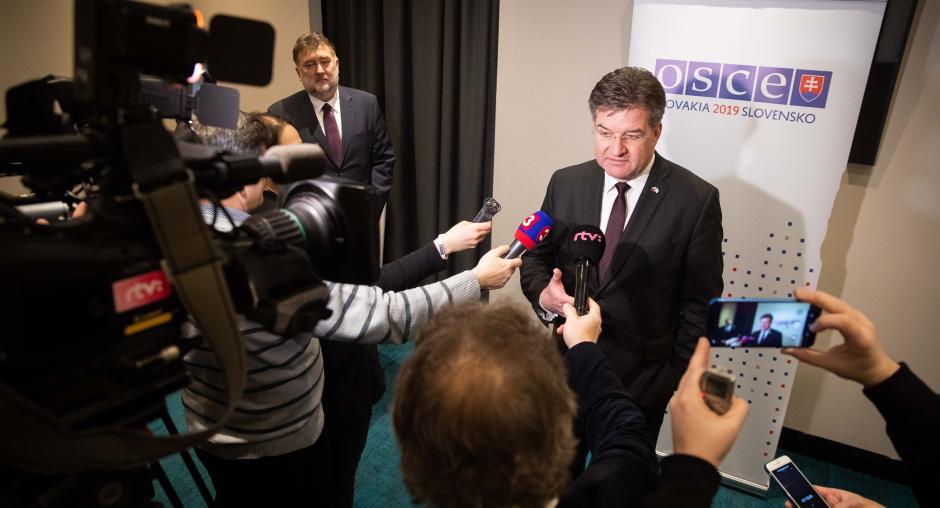OSCE Chairperson-in-Office Lajčák, on official visit to Moldova, says advancing Transdniestrian Settlement Process high on Slovak Chair’s agenda

CHISINAU, 19 January 2019 – Concluding his visit to Moldova today, OSCE Chairperson-in-Office Slovak Minister of Foreign and European Affairs Miroslav Lajčák said Slovakia’s 2019 OSCE Chairmanship attaches great importance to advancing the Transdniestrian Settlement Process as part of Slovakia’s focus on the prevention and mediation of conflicts, and in mitigating their impact on people.
“We don’t want to engage in conflict prevention and mediation just from Vienna; it needs to come from the ground. That is why I am here – to meet with and listen to the people most involved, or the most affected,” he said.
During the trip, which was undertaken just one week after the official launch of Slovakia’s OSCE Chairmanship, the OSCE Chairperson-in-Office met with political leadership in both Chisinau and Tiraspol, including Moldovan President Igor Dodon; Prime Minister Pavel Filip; Minister of Foreign Affairs and European Integration Tudor Ulianovschi; Co-ordinator of the Governing Coalition, Vlad Plahotniuc; and opposition politicians Maia Sandu and Andrei Năstase in Chisinau; and the Transdniestrian leader Vadim Krasnoselsky and chief negotiator Vitaly Ignatiev in Tiraspol.
In his discussions, Lajčák focused on small, concrete steps and real dialogue to move the settlement process forward at all levels of the negotiations. “I have now seen first-hand that real, tangible progress is happening – on both banks of the Dniester/Nistru River. The Gura Bicului-Bychok Bridge is open, children are attending Latin-script schools, students from Tiraspol university get apostilles for their diplomas, farmers are back working in the Dubasari farmlands, cars from Transdniestria are driving around with neutral-designed licence plates. So, we have the momentum. Now, we need to focus on outstanding issues to improve the day-to-day life for all people in Moldova,” Lajčák said.
“Slovakia together with international partners and the OSCE Mission will actively support Chisinau and Tiraspol to promote progress in achieving a sustainable and peaceful settlement based on the territorial integrity and sovereignty of Moldova with a special status for Transdniestria,” he added.
Speaking about the plans for 2019, the OSCE Chairperson-in-Office urged Chisinau and Tiraspol to fully finalize the “Berlin-plus package”, including the telecommunications agreement, and to identify new areas to be addressed in the same spirit of confidence-building. “We need to keep taking small, concrete steps forward. Some of the progress we have seen was almost unimaginable a few years ago. The more we engage in dialogue, the more trust we will build.”
Lajčák underlined the need to ensure that the electoral process for the 24 February parliamentary elections is conducted in a free and transparent manner – and in compliance with OSCE commitments and other international obligations and standards for democratic elections, as well as with national legislation. He reassured the Moldovan authorities that the OSCE’s Mission and institutions would continue to assist the country in promoting an inclusive, tolerant and resilient society, noting the establishment on 15 January of an election observation mission from the OSCE Office for Democratic Institutions and Human Rights (ODIHR). Moreover, he stressed that the elections should not impact the negotiation process.
Before leaving Moldova, the Chairperson-in-Office informed the representatives of the ODIHR election observation mission about his meetings and was briefed by them about the pre-election situation and the state-of-play of the ongoing preparations.
